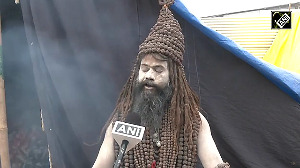Speaking on 'India's foreign policy: challenges and opportunities', Menon said, "We didn't sign it," which pacified some of the agitated parliamentarians he was addressing. MPs took the lecture seriously and quizzed Menon on Pakistan, the US, China, Sri Lanka and Myanmar. Lok Sabha Secretary General P D T Acharya presided over the function.
Menon pointed out that India and US have "agreed" to have an end user monitoring arrangement but no agreement has been signed yet.
According to the Indo-US joint statement, both countries 'agreed on the end user monitoring arrangement that will henceforth be referred to in letters of acceptance for Indian procurement of US defence technology and equipment. This systematises ad-hoc arrangements for individual defence procurements from the USA entered into by previous governments.'
Meanwhile, the Opposition parties have strongly opposed the end user monitoring arrangement on the ground that it will compromise India's sovereignty.
Foreign Minister S M Krishna had to clarify in Parliament on the issue but his statement on the End User Monitoring Agreement did not to satisfy the Opposition who walked out after charging the government with compromising India's sovereignty by allowing "intrusive" inspections of sensitive defence installations.
MPs also wanted to know what was the meaning of the 'new bilateral dialogue architecture' mentioned in the Indo-US joint statement. Menon said there are 28 dialogue mechanisms between the two countries and the effort was to try and consolidate them.
In a surprise response, regarding the wording in the joint statement with Pakistan, Menon agreed that one can conclude that it was a case of bad drafting. When asked specifically about the content of the JS with Pakistan, Menon said, "You could argue about the drafting [of the statement], it could have been better."
Immediately an MP shouted, "Then why did you draft it like this?" Menon replied hastily, "These things happen, what can we do?"
Menon also spoke in detail about China's claim on Arunachal Pradesh .
Saying that "We never had a single Chinese soldier across our borders until 1953," he added that there was no historic basis for China's claim on Arunachal Pradesh.
He said India should do better in explaining its policy and recalled the first time China took up the issue of Arunachal Pradesh in an Asian Development Bank meeting.
Menon, talking candidly, said one the biggest challenges for him was "to maintain a remarkable degree of consensus in the foreign policy that India has had in the last 60 years as the environment gets tougher."
He dismissed the contention of experts who claim that China was likely to attack India in 2012. "Will they announce it? Why do we believe such stories?" he asked
When asked to comment on the sentence in the Indo-Pak joint statement that reads 'Action on terrorism should not be linked to the Composite Dialogue process and these should not be bracketed', Menon explained that what India wanted to say was that if Pakistan did not take action against terrorism, then it cannot ask India to talk. India wants to de-link the two issues, he said.






 © 2025 Rediff.com -
© 2025 Rediff.com -